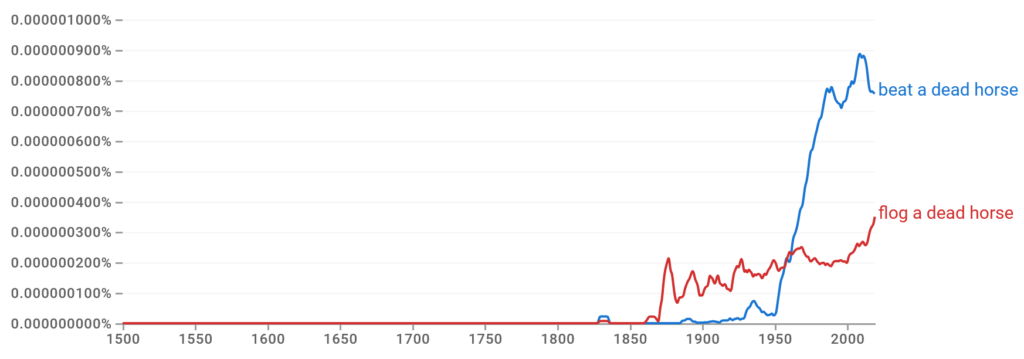Beating a dead horse means to persistently continue a fruitless or pointless task, argument, or discussion. Using the idiom suggests that the speaker is dwelling on an issue that has reached a conclusion or has become obsolete, often to the annoyance of others.
Idioms such as beating a dead horse are fixed expressions whose meanings are not directly deducible from the individual words used; instead, they convey a figurative rather than a literal meaning. They add tone and description to speech and writing. Learning idioms can help you master the nuances of the English language.
This article delves into the idiom’s meaning, origin, and usage, offering sentence examples, variations, related phrases, and tips for effective usage. Keep reading until the end to test your knowledge with a quick quiz on the idiom beat a dead horse.

What Does the Idiom Beating a Dead Horse Mean?
The idiom beating a dead horse means to belabor a point, to continue in a particular action that wastes time or has no chance of success. It implies that the issue or topic has already been thoroughly addressed or resolved or is no longer relevant, making further effort or discussion redundant and unproductive.
Merriam-Webster defines beat a dead horse as “to keep talking about a subject that has already been discussed or decided” or “to waste time and effort trying to do something that is impossible.”
The phrase conjures up a literal and slightly gruesome image of beating a lifeless horse, expecting it to get up and pull a wagon. This is obviously an attempt doomed to failure.
For instance, despite having reached the time limit on the semester final, I found myself having to address a student who insisted they still had time to finish their work. I had to explain they were beating a dead horse since the grading period had ended and the grade books were closed.
Variations of the Idiom
Here are some variations that infer the same meaning as beat a dead horse:
- Flog a dead horse
- Milk a dead cow
- Paddle a dead duck
- Dig up a dead horse
How Is Beating a Dead Horse Commonly Used in Context?
The idiom beat a dead horse vividly captures the notion of persisting in a futile or irrelevant endeavor. To uncover the nuanced applications of this expressive phrase, explore the following sections for valuable insights:
What Are the Different Ways to Use the Idiom Beating a Dead Horse?
- Repetitive argument: “Continuing to debate the decision long after it was made is like beating a dead horse.”
- Obsolete discussion: “Rehashing outdated issues in the meeting is beating a dead horse; let’s focus on the current challenges.”
- Unnecessary explanation: “Providing extensive details after everyone understands the concept is akin to beating a dead horse.”
- Persistent complaint: “Complaining about a situation without taking action is like beating a dead horse; it won’t change anything.”
- Overemphasizing a point: “Repeatedly stressing a minor error is beating a dead horse; let’s move on to more crucial matters.”
Where Can You Find Examples of the Idiom Beating a Dead Horse?
Examples of the idiom beating a dead horse can be found in various forms of media, including literature, movies, television shows, news articles, and everyday conversations.
Online news sources commonly use the idiom, especially in opinionated pieces:
“Unfortunately, Jeff Sessions is choosing to beat a dead horse to death by trying to just really claw onto that failed war on drugs.” (The Daily UW)
“Hill said he didn’t want to flog a dead horse and having floated the name-change idea in the public, would like to step back.” (The New Zealand Herald)
What Are Some Tips for Using the Idiom Beat a Dead Horse Effectively?
- Provide context: When using the idiom, provide some context or explanation to ensure that others understand the meaning.
- Use descriptive language: Depending on the context, you can use additional descriptive language to emphasize the futility or pointlessness of the action or discussion.
- Provide alternatives or solutions: If you’re using the idiom to discourage further discussion or action, consider offering alternative approaches or solutions.
- Use idioms sparingly: Idioms are effective when used sparingly to add impact to your language.
What Is the Origin of the Idiom Beat a Dead Horse?

The phrase beat a dead horse entered common parlance in the mid-19th century, but its root can be traced back to naval slang from the 17th century.
Sailors usually received payment for their first month of labor upfront, a term known as dead horse. Once this initial month concluded, seamen would often hold a ritual named Flogging the Dead Horse, symbolizing the end of the period for which they had already been compensated.
The expression to beat a horse that is dead was first used in Johnson’s A Dictionary of the English Language, published in 1755. This may mark the first time the literal reference was used as a metaphor to compare a worthless endeavor to beating a dead horse.
How Did the Idiom Evolve Over Time?
The idiom has evolved from naval slang in the 17th century, where sailors marked the end of their compensated period with a ritual. The metaphorical use emerged in the mid-19th century, comparing a futile effort to beating a dead horse. Over time, the idiom has maintained its essence of emphasizing the futility of persisting in a fruitless or irrelevant task.
What Are Some Related Terms to Beat a Dead Horse?
Take a look at these related terms and phrases to help you place the idiom beat a dead horse appropriately within your own materials.
Synonyms
While there are no direct synonyms for the idiom beat a dead horse that carry the same exact meaning, there are several alternative words or expressions that convey a similar notion:

- Rehash
- Strong matches
- Overwork
- Pound
- Repeat
- Belabor
- Dwell upon
- Spin the wheels
Antonyms
These antonyms convey the opposite meaning, suggesting productive or fruitful actions:
- Move forward
- Find a solution
- Focus on the future
- Explore new possibilities
- Seek alternative perspectives
- Adapt and evolve
Beating a Dead Horse: Test Your Knowledge!
Choose the correct answer.
What Have We Learned About Beating a Dead Horse?
In closing, beating a dead horse is an idiom suggesting futile persistence in a matter that’s already resolved or no longer relevant, often to the irritation of others. It represents that quintessential aspect of idiomatic expressions where the figurative supersedes the literal, adding depth and color to language.
As we have unraveled its meaning, traced its origin, and dove into its usage, one can see how studying such phrases enhances one’s grasp of English subtleties.
If this exploration of beat a dead horse piqued your curiosity, we invite you to immerse yourself in our extensive collection of idiom guides on our site. Each guide offers a wealth of knowledge, from sentence examples to related phrases and effective usage tips. And remember, the learning doesn’t end here—there’s always a new idiom to unwrap and understand!
